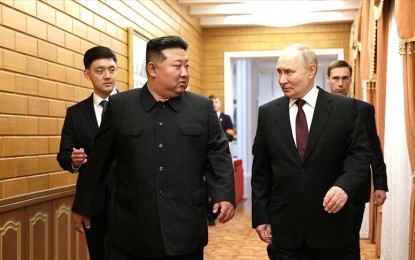
STRENGTHENING TIES. Russian President Vladimir Putin meets with Chairman of State Affairs of the Democratic People's Republic of Korea Kim Jong-un upon his invitation in Pyongyang, North Korea on June 18, 2024. Russia and North Korea, under a new agreement, made a commitment to help each other in the event of aggression against either country, Putin said on Wednesday (June 19, 2024). (Anadolu photo)
MOSCOW – Russia and North Korea, under a new agreement, made a commitment to help each other in the event of aggression against either country, Russian President Vladimir Putin said on Wednesday.
Speaking at a news conference in Pyongyang following a meeting with North Korean leader Kim Jong-un, Putin said security and international issues were significant topics of the talks.
"The comprehensive partnership agreement signed today provides, among other things, for mutual assistance in the event of aggression against one of the parties to this agreement," Putin said.
Putin noted that the US and other NATO countries announced deliveries of high-precision long-range weapons systems, F-16 aircraft and other high-tech weapons, equipment to Ukraine for strikes on the Russian territory.
"This is not only a statement, it is already happening. And all this is a gross violation by the Western countries ... of various international obligations," he said.
In such circumstances, Russia does not exclude the development of military-technical cooperation with Democratic People's Republic of Korea (DPRK), he underscored.
Kim Jong-un, for his part, said the agreement is "peace-loving, defensive in nature," adding that it will accelerate the establishment of a multipolar world.
"This powerful treaty is nothing more than a document of a truly constructive, promising, exclusively peace-loving and defensive nature, designed to protect and defend the basic interests of the peoples of the two countries. I have no doubt that it (agreement) will become the driving force to accelerate the establishment of a new multipolar world," he stressed.
The North Korean leader also described the agreement as an important document that would lay the groundwork for future cooperation between the two countries, including in economics, politics, and military affairs.
"Comrades, the time has changed. ... Today, an anchor has been raised at this place and the solemn start of allied relations between the DPRK and the Russian Federation has been announced, representing a watershed in the history of the development of Korean-Russian relations," he said.
Russia rejects 'sanctions, language of blackmail and dictate'
Russia attaches "the utmost importance" to strengthening Russian-Korean relations in all areas, Putin said, noting that in 2023 the trade turnover between the two countries increased ninefold, and over the five months of this year rose by 54%.
Russia and Korea pursue an independent foreign policy and do not accept "the language of blackmail and dictate," oppose "politically motivated sanctions and restrictions, which undermine the global political and economic system," Putin stressed.
The Russian leader pledged to counteract the practice of "sanctions strangulation," arguing that it was "a tool that the West is using to maintain its hegemony."
"In this context, I would like to note that the indefinite restrictive regime of the UN Security Council against the DPRK, inspired by the United States and its allies, should be reviewed," he said.
Putin argued that tensions in the northeastern Asia was provoked by the expansion of military infrastructure in the region, "which is accompanied by a significant increase in the scale and intensity of various military exercises involving the Republic of Korea and Japan," the countries "hostile" to North Korea.
"Attempts to hold the Democratic People's Republic of Korea responsible for the deterioration of the situation are categorically unacceptable. Pyongyang has the right to take reasonable measures to strengthen its own defense capability, ensure national security and protect sovereignty," he emphasized.
Russia, for its part, is ready to contribute to the diplomatic settlement of differences in the region, he said. (Anadolu)
